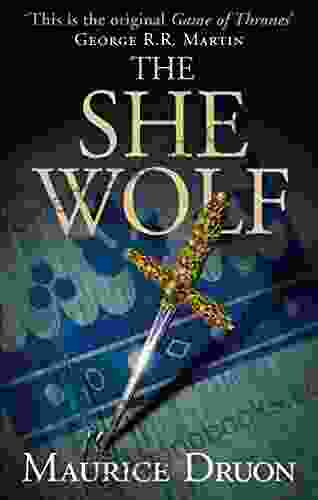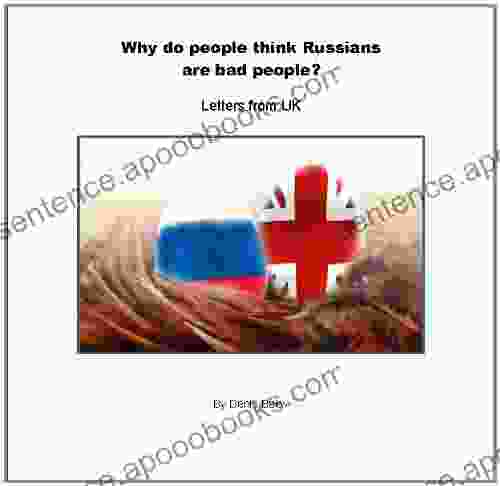Why Do People Think Russians Are Bad People?

4.6 out of 5
| Language | : | English |
| File size | : | 540 KB |
| Text-to-Speech | : | Enabled |
| Screen Reader | : | Supported |
| Enhanced typesetting | : | Enabled |
| Word Wise | : | Enabled |
| Print length | : | 51 pages |
| Lending | : | Enabled |
| Item Weight | : | 14.8 ounces |
| Dimensions | : | 6.61 x 0.94 x 5.75 inches |
Russians are often stereotyped as being cold, heartless, and aggressive. They are often seen as a threat to other countries, and their motives are often questioned. But why do people think Russians are bad people?
There are a number of factors that contribute to this negative stereotype. One factor is the long history of conflict between Russia and other countries. For centuries, Russia has been involved in wars with its neighbors, and these wars have often been bloody and destructive.
Another factor is the Soviet Union's repressive policies. For over 70 years, the Soviet Union was a totalitarian state that suppressed dissent and human rights. The Soviet government also engaged in a number of aggressive actions, including the invasion of Afghanistan and the annexation of Crimea.
The media also plays a role in perpetuating the negative stereotype of Russians. In movies and TV shows, Russians are often portrayed as villains or as cold and unfeeling characters. This portrayal can further reinforce the negative stereotypes that people have about Russians.
It is important to remember that not all Russians are bad people. In fact, the vast majority of Russians are peaceful and law-abiding citizens. However, the negative stereotype of Russians persists, and it can have a real impact on how people view and interact with Russians.
If we want to overcome the negative stereotype of Russians, we need to start by understanding the factors that contribute to it. We need to learn about Russian history and culture, and we need to challenge the negative stereotypes that we see in the media. We also need to be more open to interacting with Russians and getting to know them as individuals.
By understanding the reasons why people think Russians are bad people, we can start to break down the stereotypes and build bridges between our two countries.
Historical Factors
The history of Russia is long and complex, and it has been marked by both periods of great achievement and periods of great suffering. The following are some of the key historical events that have shaped the way that people think about Russians:
- The Mongol invasion (1237-1242): The Mongol invasion of Russia was a devastating event that had a profound impact on Russian history. The Mongols conquered and ruled Russia for over 200 years, and their rule was characterized by violence and brutality. The Mongol invasion left a lasting legacy of fear and distrust of foreigners in Russia.
- The rise of the Russian Empire (1721-1917): The Russian Empire was a vast and powerful empire that spanned much of Eurasia. The Russian Empire was often seen as a threat to other countries, and its expansionist policies led to a number of wars with its neighbors.
- The Bolshevik Revolution (1917): The Bolshevik Revolution was a major turning point in Russian history. The Bolsheviks established a communist government in Russia, and they pursued a policy of isolationism and repression. The Bolshevik government also engaged in a number of aggressive actions, including the invasion of Afghanistan and the annexation of Crimea.
- The Cold War (1947-1991): The Cold War was a period of tension between the United States and the Soviet Union. The Cold War was characterized by a number of proxy wars and arms races, and it led to a great deal of fear and distrust between the two superpowers.
These are just a few of the key historical events that have shaped the way that people think about Russians. These events have left a lasting legacy of fear and distrust, and they have contributed to the negative stereotype of Russians that persists today.
Political Factors
The political system in Russia has also played a role in shaping the way that people think about Russians. For over 70 years, Russia was a totalitarian state that suppressed dissent and human rights. The Soviet government also engaged in a number of aggressive actions, including the invasion of Afghanistan and the annexation of Crimea.
The current Russian government is led by President Vladimir Putin. Putin is a former KGB officer, and he has been accused of authoritarianism and human rights abuses. Putin's government has also been accused of interfering in elections and engaging in other aggressive actions.
The political system in Russia has created a climate of fear and distrust. This climate of fear and distrust has made it difficult for Russians to speak out against their government, and it has also made it difficult for other countries to trust Russia.
Cultural Factors
The culture of Russia is also a factor that contributes to the negative stereotype of Russians. Russian culture is often seen as being cold and unfeeling. This is due in part to the harsh climate of Russia, which has forced Russians to be tough and resilient.
Russian culture also values strength and power. This is reflected in the Russian military, which is one of the most powerful in the world. The Russian military has been used to defend Russia from its enemies, but it has also been used to侵略其他国家.
The Russian culture of strength and power can be intimidating to other countries. This intimidation can lead to fear and distrust, and it can contribute to the negative stereotype of Russians.
How to Overcome the Negative Stereotype of Russians
The negative stereotype of Russians is a complex issue that has been shaped by a number of factors. To overcome this stereotype, we need to start by understanding the factors that contribute to it. We need to learn about Russian history and culture, and we need to challenge the negative stereotypes that we see in the media. We also need to be more open to interacting with Russians and getting to know them as individuals.
By understanding the reasons why people think Russians are bad people, we can start to break down the stereotypes and build bridges between our two countries.
4.6 out of 5
| Language | : | English |
| File size | : | 540 KB |
| Text-to-Speech | : | Enabled |
| Screen Reader | : | Supported |
| Enhanced typesetting | : | Enabled |
| Word Wise | : | Enabled |
| Print length | : | 51 pages |
| Lending | : | Enabled |
| Item Weight | : | 14.8 ounces |
| Dimensions | : | 6.61 x 0.94 x 5.75 inches |
Do you want to contribute by writing guest posts on this blog?
Please contact us and send us a resume of previous articles that you have written.
 Book
Book Novel
Novel Page
Page Chapter
Chapter Text
Text Story
Story Genre
Genre Reader
Reader Library
Library Paperback
Paperback E-book
E-book Magazine
Magazine Newspaper
Newspaper Paragraph
Paragraph Sentence
Sentence Bookmark
Bookmark Shelf
Shelf Glossary
Glossary Bibliography
Bibliography Foreword
Foreword Preface
Preface Synopsis
Synopsis Annotation
Annotation Footnote
Footnote Manuscript
Manuscript Scroll
Scroll Codex
Codex Tome
Tome Bestseller
Bestseller Classics
Classics Library card
Library card Narrative
Narrative Biography
Biography Autobiography
Autobiography Memoir
Memoir Reference
Reference Encyclopedia
Encyclopedia Eric Johnson
Eric Johnson Reem Harb
Reem Harb Nabiha Ali
Nabiha Ali Gudrun Heyens
Gudrun Heyens Mario Perazzelli
Mario Perazzelli Emily Larkins
Emily Larkins Logan Ryles
Logan Ryles Jackie White
Jackie White Amber Adams
Amber Adams Leslie A Sprout
Leslie A Sprout John R Dolan
John R Dolan Vikki Walton
Vikki Walton Zoe Brisby
Zoe Brisby Ellen Murphy
Ellen Murphy David B Biebel
David B Biebel Ellen C Carillo
Ellen C Carillo John Maynard Keynes
John Maynard Keynes Daniel Love
Daniel Love Robert H Churchill
Robert H Churchill Paul Almeida
Paul Almeida
Light bulbAdvertise smarter! Our strategic ad space ensures maximum exposure. Reserve your spot today!

 Christian BarnesExplore the Wonderful World of Consumers and Producers with Our Captivating...
Christian BarnesExplore the Wonderful World of Consumers and Producers with Our Captivating...
 Dustin RichardsonEmbark on a Purrfect Cross-Stitch Journey with "Counted Cross Stitch Patterns...
Dustin RichardsonEmbark on a Purrfect Cross-Stitch Journey with "Counted Cross Stitch Patterns...
 Donald WardGhost Letters Free Verse Editions: A Poetic Masterpiece Unfolding the Shadows...
Donald WardGhost Letters Free Verse Editions: A Poetic Masterpiece Unfolding the Shadows...
 Richard AdamsUnleash the Primal Power of "The She-Wolf: The Accursed Kings" and Immerse...
Richard AdamsUnleash the Primal Power of "The She-Wolf: The Accursed Kings" and Immerse... Ernesto SabatoFollow ·4.2k
Ernesto SabatoFollow ·4.2k George MartinFollow ·18k
George MartinFollow ·18k Jeremy CookFollow ·9.2k
Jeremy CookFollow ·9.2k Dominic SimmonsFollow ·9.8k
Dominic SimmonsFollow ·9.8k Todd TurnerFollow ·16.6k
Todd TurnerFollow ·16.6k Andres CarterFollow ·16.2k
Andres CarterFollow ·16.2k Darren BlairFollow ·2.3k
Darren BlairFollow ·2.3k Zachary CoxFollow ·5.5k
Zachary CoxFollow ·5.5k

 Julian Powell
Julian PowellShetland Pony: Comprehensive Coverage of All Aspects of...
The Shetland...

 Cason Cox
Cason CoxHow Anaesthetics Changed the World: A Medical Revolution...
Imagine a world where surgery is an...

 Harold Powell
Harold PowellUnleash Your Inner Songwriter: The Ultimate Guide for...
Calling all aspiring songwriters!...

 Nikolai Gogol
Nikolai GogolUnleash Your Artistic Potential: Quick Draw Anatomy for...
In the dynamic and visually...

 Tim Reed
Tim ReedThe Rock 'n' Roll Life of Legendary Sax Man Bobby Keys
The Rock 'n' Roll Life...

 Damon Hayes
Damon HayesMoney Management Activities for Youth: A Guide to...
In an era marked by rapidly...
4.6 out of 5
| Language | : | English |
| File size | : | 540 KB |
| Text-to-Speech | : | Enabled |
| Screen Reader | : | Supported |
| Enhanced typesetting | : | Enabled |
| Word Wise | : | Enabled |
| Print length | : | 51 pages |
| Lending | : | Enabled |
| Item Weight | : | 14.8 ounces |
| Dimensions | : | 6.61 x 0.94 x 5.75 inches |




